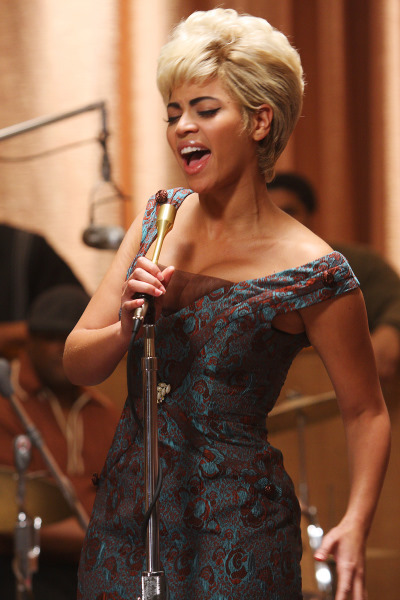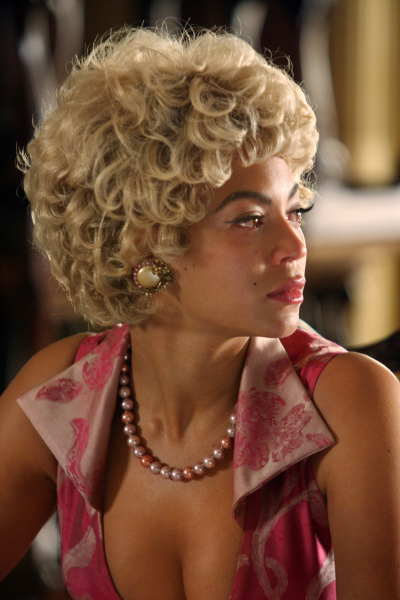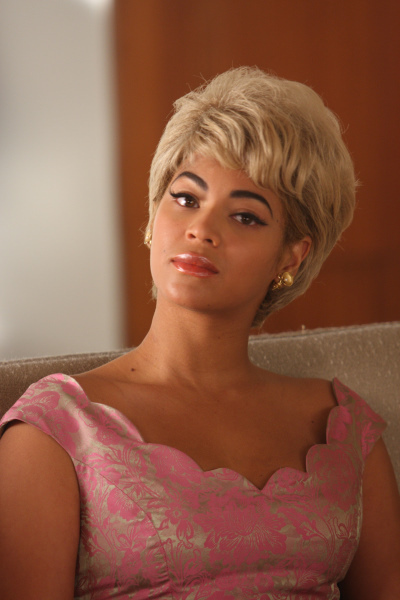Etta James (born Jamesetta Hawkins on January 25, 1938) is an American blues, soul, R&B, rock & roll, gospel and jazz singer and songwriter. James is the winner of four Grammys and seventeen Blues Music Awards. She was inducted into the Rock & Roll Hall of Fame in 1993, the Blues Hall of Fame in 2001, and the Grammy Hall of Fame both in 1999 and 2008. In the 1950s and 60s, she had her biggest success as a blues and R&B singer. She is best known for her 1961 ballad At Last , which has been featured in many movies, television shows, commercials, and web-streaming services since its release. James has a contralto vocal range.Jamesetta Hawkins was born in Los Angeles, California to an unmarried 14-year-old African-American mother, Dorothy Hawkins. She claimed that her mother told her that her father was pool player Rudolph Minnesota Fats Wanderone, who was Caucasian, and that they received financial support from him on the condition that they keep his paternity a secret. James was born in Los Angeles in 1938, at a time when Wanderone was known to be managing a pool hall in Washington, D.C.She received her first professional vocal training at the age of five years old, from James Earle Hines, musical director of the Echoes of Eden choir at St. Paul Baptist Church in Los Angeles.James' family moved to San Francisco in 1950 and James soon teamed up with two other girls to form a Doo-wop singing group. When the girls were fourteen, band leader Johnny Otis had them audition: they sang an answer to Hank Ballard's Work With Me, Annie called Roll With Me Henry. Otis particularly liked the song, and against her mother's wishes, James and the trio went to Los Angeles to record the song in 1954. The song was recorded under the label Modern Records. By this time, the trio renamed the song The Wallflower (Dance with Me, Henry) and released it in 1955. James named her vocal group The Peaches. Richard Berry, a Los Angeles Doo Wop luminary is featured on some of their records.In 1969 James married Artis Mills. They had two sons, Donto and Sametto James. Her granddaughter, Donto's daughter Karissia, was born in 1995.There are at least two versions of how Johnny Otis discovered Etta James. Otis's version is that she came to his hotel room after one of his performances in San Francisco and persuaded him to audition her (this is the version that Johnny tells to this day). Another frequently told story is that Otis spotted her performing in an L.A. nightclub with The Peaches and, having conceived of the answer song to Hank Ballard's Work With Me, Annie, arranged with the Bihari brothers for Modern Records to record The Wallflower with James. The Wallflower reached number two on the rhythm and blues charts in February 1955 but was undercut in the wider market by a rushed-out cover version by Georgia Gibbs on Mercury Records.In fact, the very first time she was recorded in studio, they used the first take she recorded and it became number one on the top 100 songs in the nation. The song's royalties were divided between Hank Ballard, Etta James and Johnny Otis, and its huge success attracted the attention of the R&B world, resulting in James going on tour with Little Richard. On the tour, according to James, she witnessed and experienced situations to which minors are not usually privy, and she allegedly acquired a drug habit. Today Etta has a troublesome personality which may have resulted from her past habits. The Wallflower was a #1 hit on the R&B charts of 1955. The song was later a hit in the white market for Georgia Gibbs, re-written as Dance with Me, Henry . Soon after the song's success, The Peaches and Etta parted company, but this did not halt her career. She continued to record and release albums throughout much of the decade, and enjoyed more success. Her follow-up, Good Rockin' Daddy was released and became another hit in the fifties. Other songs however, such as Tough Lover and W-O-M-A-N failed to gain any significant success at all. James toured with Johnny Guitar Watson and Otis Redding in the fifties and has cited Watson as the most significant influence on her style.In 1960, Etta signed a recording contract with Chess Records. The recording company went into high gear with James, releasing many duets with her then-boyfriend, the married Harvey Fuqua, who was the lead singer of the Moonglows at the time. One of her duets with Fuqua, called If I Can't Have You , became a hit on the R&B charts in 1960. As a solo artist she had more enduring success. One of her first singles released by Chess in 1960 was called All I Could Do Was Cry . This Blues number became a big hit for James on the R&B charts in 1960. James' sassy vibe added a significant touch of personality to the song. Leonard Chess, one of the founders of Chess Records, helped James along the way. He saw the potential for James to go into a more Pop-oriented direction. Because of his advice, James started recording more pop tunes for the label.The year 1961 was a year of great change for James, seeing the release of one of her first pop-oriented tunes, At Last written by Mack Gordon and Harry Warren. The song became a big hit, reaching #2 on the R&B charts. The song even went as far as #22 on the Pop charts that year, proving that the Pop crossover direction was successful for her. Although it may have turned out to be less of a hit than expected on the Pop charts, it still made the Top 30. The song became her signature song the tune for which most people remember her. Other hits followed, including Trust In Me, as well as the 1962 tune Something's Got a Hold On Me (recorded in the UK by Elkie Brooks), which showed more of James' Gospel side, a genre she had sung since childhood.Her 1963 album Etta James Rocks the House , which was cut at Nashville's New Era club, also gave her career a boost. She had other big hits in the 1960s, but mainly on the R&B charts. The song Pushover was a hit for her in 1963. Other hits followed, like Stop the Wedding , Fool That I Am and Don't Cry Baby , which were all hits for her between 1961 and 1963. From this, James became one of the most successful R&B artists of the 1960s, having many more Top Ten and Top Twenty hit singles on the charts. She has been classified as one of the pioneers of the Blues, being acclaimed to the ranks of artists like B. B. King. Performing in Memphis, Tennessee, the city where blues started, didn't hurt. Between 1965 and 1967, she experienced less success, but in her 1967 releases provided a comeback.In 1967, Cadet Records released Tell Mama, which became a Top Ten hit on the R&B charts that year. The song showed James' comeback, after a dry period of no major Top 100 hits for almost four years, and again made her a household name. The follow-up single, Security, proved to be nearly as successful, and proved that James had staying power on the charts again. After that, the Top 40 hits began to dwindle, though James continued on the R&B charts. Despite the death of Leonard Chess, Etta James stayed with the Chess label into 1975. Towards the end of the Chess years though, James went into more rock-based songs. After Chess folded, Etta recorded for numerous other labels and continued to release albums, like 1978's Deep In the Night by Atlantic Records. Etta was able to work with Bruce Robb (producer) for the production, engineering, and mixing of Deep In the Night which has many individual hits and the last album she made for a few years.Despite a dry period during the early to mid 80s, Etta got back on track and began to record music again. She received accolades for her 1981 rendition of Randy Newman's God's Song . Her 1988 album Seven Year Itch proved this comeback capability. The album showed more James' Soul side. In 1989, Etta recorded the song Avenue D with David A. Stewart of Eurythmics fame. The song was featured on the soundtrack to the Robert Wise film Rooftops . She also performed with the Grateful Dead for two shows in 1982, demonstrating the diveristy of her admirers.Into the 1990s, she continued to record and perform. Her albums widely varied in styles and genres of music. Her 1992 album The Right Time was another Soul album that was produced by Elektra Records. The album was upbeat as well. She began to record more Jazz music as well, which became the subject for many of her 1990s albums. In 1998 she released a Christmas album called An Etta James Christmas.To a younger generation, Etta is known for the Muddy Waters song I Just Wanna Make Love to You , used in television commercials for Coca-Cola and for John Smith's bitter (beer). The Rolling Stones, Chuck Berry and Foghat have also recorded the song. Etta's version was a surprise Top 10 UK hit in 1996. Later in life, James struggled with obesity. She reached more than 400 pounds, experienced mobility and knee problems, and often needed a wheelchair. In 2003, James underwent gastric bypass surgery and lost over 200 pounds On May 6, 2003, James released a blues rock album of new material, Let's Roll.James was inducted into the Rock and Roll Hall of Fame in 1993. She was inducted into the Blues Hall of Fame in 2001. Her pioneering contribution to the genre has been recognized by the Rockabilly Hall of Fame. In 2003 she received a star on the Hollywood Walk of Fame as well as a Grammy Lifetime Achievement Award.In 2004, Rolling Stone Magazine ranked her #62 on their list of the 100 Greatest Artists of All Time.James won three Grammys: best jazz vocal performance (for Mystery Lady in 1994), Best Contemporary Blues album (for Let's Roll in 2003) and Best Traditional Blues album (for Blues to the Bone in 2004). A new album was also released in 2006 called All the Way, which was released by RCA Records.Etta James performs at the top world jazz festivals in the world, such as the Montreux Jazz Festival in 1977, 1989, 1990, and 1993, performed nine times at the legendary Monterey Jazz Festival, and the San Francisco Jazz Festival five times. She also performs often at free city outdoor summer arts festivals throughout the US.RnB/Hip-Hop/Pop artist Beyonce plays the role of Etta James in her upcoming movie Cadillac Records, performing a cover of At Last live in a recording studio.
Show less «







